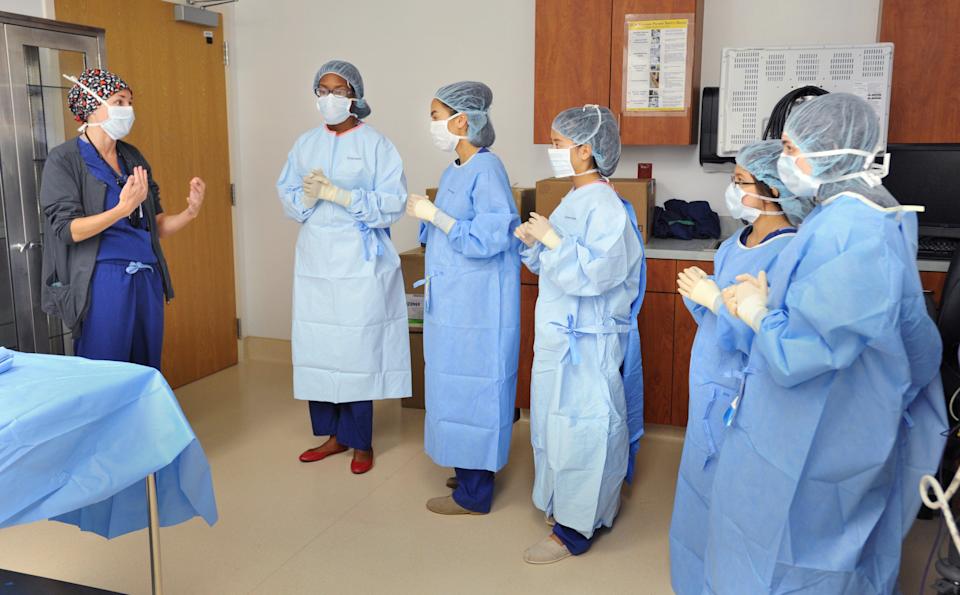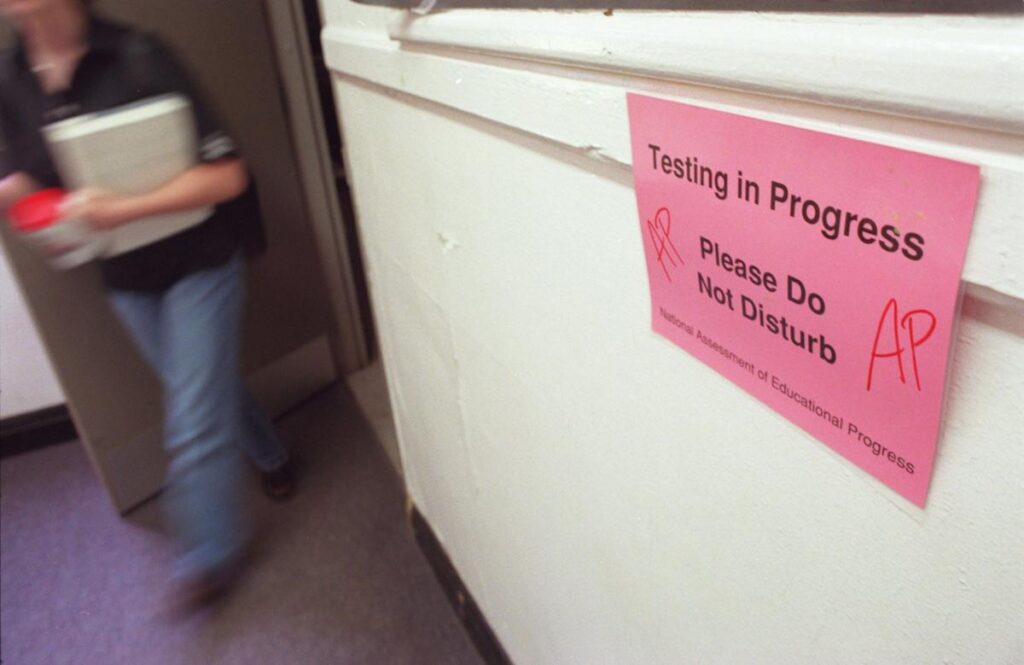State lawmakers’ plans to curb public school funding dedicated to advanced academics and career education have triggered questions, and critics’ alarm, as school administrators plan for a budget year that starts July 1.
School districts across Northeast Florida stand to lose a combined $23 million in funds set aside to underwrite career and professional education programs, dual enrollment and Advanced Placement, International Baccalaureate and Advanced International Certificate of Education (AICE) courses, according to data in an April 9 analysis by the Florida Policy Institute, a center-left think tank in Orlando.
Losses in Duval, St. Johns, Clay, Nassau and Baker County school districts in the 2025-2026 budget would equal program funding for 4,314 students, according to the analysis.
A student finishes an Advanced Placement test at Douglas Anderson School of the Arts in this 1997 photo.
More: AP Psychology could return to some Duval schools as College Board approves course syllabus
Supporters of the change have argued funding could still be available to school districts without restrictions obligating its use for specific programs, but school administrators have voiced worry.
“Duval County Public Schools (DCPS) is deeply concerned about the proposed revisions,” begins a school district fact sheet on the funding changes that haven’t been finalized by the Florida Legislature.
What’s happening to AP, IB, career training funding in Florida?
Both the Florida House and Senate voted April 9 for legislation changing a formula the state uses to supplement the per-student funding that pays to keep public schools running and to reward high test results. Budget changes aren’t locked in, however, until a full state budget is completed ahead of the May 2 final day of the legislative session.
The House legislation, which fills 142 pages, basically cuts in half a type of supplement the state budgets for some high-value categories of instruction. (Legislators call these funds “categoricals.”)
The funds are enhancements measured as additions to the full-time equivalent (FTE) funding that pays for a typical student’s schooling. For example, a student graduating the International Baccalaureate program would be worth an additional 0.15 FTE, a drop from the extra 0.3 FTE allowed previously. Students earning industry certificates can be worth 0.05 to 0.5 FTE, depending on factors that include whether the student earned college credits, and how many.
For the 2024-2025 budget, the state reported that its base funding per student was $5,330.98. Its unweighted FTE value was $8,982.79.

Lt. Jaime York (left) a registered nurse and training officer, talks with students from Darnell-Cookman School of the Medical Arts about procedures for the operating room at Naval Hospital Jacksonville in this 2016 photo.
What would funding look like, county by county?
The Florida Policy Institute analysis said the funding change could remove about $8 million from Duval schools’ advanced academics and career education, equivalent to funding for 1,502 students. The analysis said St. Johns schools could lose just under $9 million, enough for 1,686 students. Clay schools could lose $4.4 million, enough for 833 students. The impact to Nassau schools could be $2.5 million, enough for 231 students, while Baker schools could lose $328,000, enough for 62 students, the analysis said.
Is Florida really cutting funding for AP classes, IB and career training?
This question seems simple, but legislators have argued both ways.
Sen. Danny Burgess, R-Zephyrhills, wrote an op-ed for the Florida Politics website April 10 saying that until now the state has been “double-funding” AP and AICE courses by allotting $852 per course, then another $852 for each student whose score on a course exam matched a state target.
“We are cutting the second $852 in half to align these necessary courses with actual costs,” Burgess wrote for the website, saying that the advanced programs would automatically get $426 per student and the other $426 would be left with the school district to spend as it sees fit.
Students work on a tiny house project at A. Philip Randolph Career Academies in this 2017 photo. The Duval County School System has been increasing the career and technology courses available to students which may lead to college credits or industry certifications which could lead to jobs without a college degree.
“If the school district decides to keep investing those funds in AP/IB/AICE courses, like they were required to do previously, that’s great with us,” he wrote. “If they would rather spend the money on teacher raises, student services or other improvements, that works too.”
But Sen. Carlos Guillermo Smith, D-Orlando, pointed to a Senate staff analysis of a bill outlining effects of funding changes to argue money wouldn’t all be left for local decisions.
“All you have to do is look at page 9” of the analysis, he said of a section dealing with bonuses for teachers involved in AP and other course offerings the state calls acceleration programs. “It says ‘the proposed reductions to the acceleration program bonuses may provide an estimated $292 million in savings to the state. Senators, to me that doesn’t sound like we’re simply transferring these funds over … and it’s not a budget-neutral outcome, either. That’s nearly $300 million being squeezed out of public schools directly as a result of reductions to the acceleration programs.”
How would these funding changes affect Duval schools?
Seventy-six percent of Duval schools’ 2024 graduates last year earned some type of credit through either accelerated academics or career and professional training in filed ranging from construction to health care and engineering, the school district’s fact sheet reported. It listed limited courses, a shortage of qualified teachers and costs to students’ families for tests and lab materials as potential impacts of funding changes.
Duval schools administrators were already working on cost-saving steps to try to meet a projected $100 million funding shortfall for the 2025-26 year.
But simply offering fewer advanced classes and less career training could make the county’s schools less attractive to families picking between traditional public schools, charters and private schools cashing in on the state’s enthusiastic support for vouchers to underwrite alternatives.
The Duval County School Board is slated to hear a budget update at a workshop scheduled for 9:15 a.m. on April 15 at the school district’s Southbank offices.
This article originally appeared on Florida Times-Union: Will Northeast Florida schools lose state cash for AP, career training?
Read the full article here


